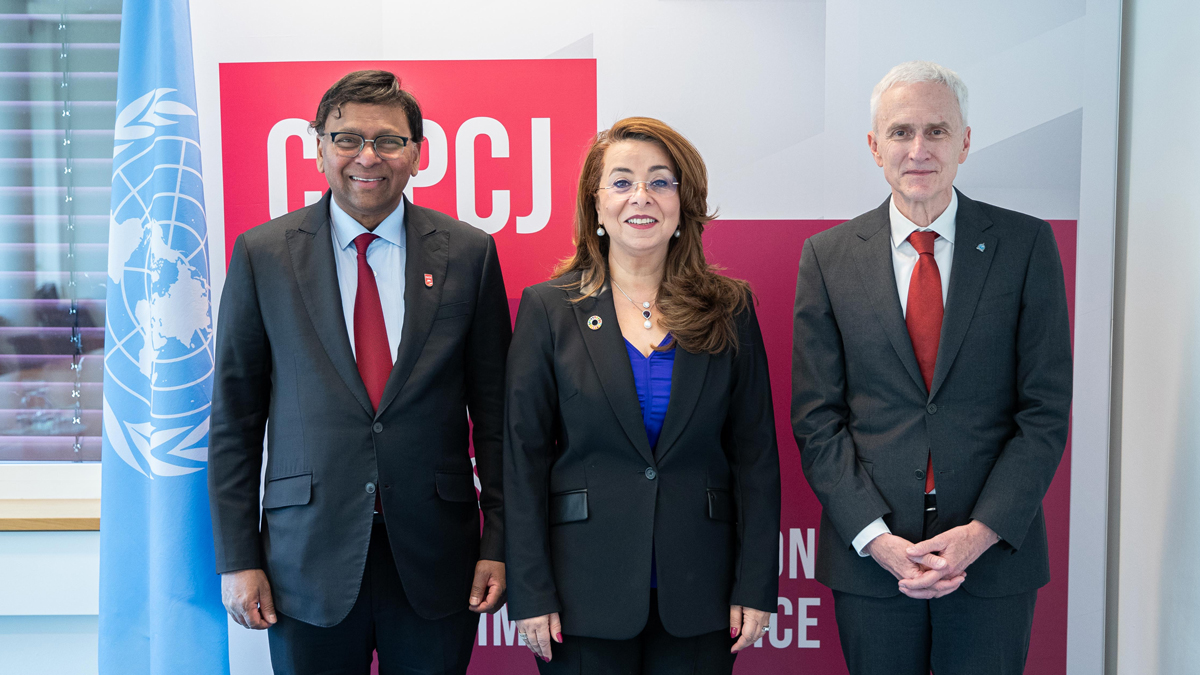
Vienna (Austria), 13 May 2024 - Countries need to urgently step up their efforts to target the huge illicit profits generated by transnational organized crime that facilitate conflicts, fund terrorism, and negatively impact vulnerable populations.
This was the unprecedented call to action from the heads of the Financial Action Task Force (FATF), INTERPOL and the UN Office on Drugs and Crime (UNODC) in Vienna today at a high-level side event on the first day of the 33rd session of the Commission on Crime Prevention and Criminal Justice (CCPCJ).
By focussing on the proceeds of crime and the illicit financial networks behind them, Member States can more effectively combat and disrupt organized crime networks and enhance the effectiveness of crime prevention efforts.
Disincentivizing criminal activity through targeting illicit profits would also positively impact across all Goals of the 2030 Sustainable Development Agenda, such as inclusive economic growth, financial stability, and strengthened institutions and governance.
“Global financial integrity is critical for financial stability, inclusion, and for peace and security,” said FATF President T. Raja Kumar. “It can only be achieved through the robust and effective implementation of money laundering and terrorist financing standards. The FATF is committed to playing its part and stepping up our work on the cross-cutting activities which enable all serious crime, especially the laundering of the proceeds of crime. We must seize the initiative and collectively implement asset recovery to cut off the lifeblood of criminal enterprise – their money and their assets. This must be a key preventive strategy that all governments must adopt.”
INTERPOL Secretary General Jürgen Stock said: “Just as criminals will trade any commodity to generate profits, every avenue must be followed to deprive them of these illicit gains. Choking off the illegal revenue streams is essential in promoting rule of law and protecting vulnerable communities. Action across all sectors and at the global level is needed now, and INTERPOL stands ready to provide whatever support necessary.”
“Money laundering, terrorism financing, and their predicate offences are fuelling instability, violence, and exploitation worldwide. Safeguarding financial integrity is vital to promoting peace and security, driving sustainable development, and shielding the most vulnerable,” said UNODC Executive Director Ghada Waly. “UNODC stands ready to work with governments, the private sector and our partners at FATF and INTERPOL to enhance financial and criminal investigations, to dismantle the illegal financial networks that sustain terrorism and transnational organized crime.”
While the three leaders highlighted recent enhancements to FATF’s international standards on anti-money laundering and terrorism financing, they also called for accelerated progress on policy reforms and capacity building ahead of the UN 2026 Crime Congress, to be hosted by the United Arab Emirates.
With financial integrity a key pillar in creating stability, of particular importance is the greater support still required for countries struggling to implement effective anti-money laundering and terrorist financing frameworks.
They also recognized the positive impact of Member States increasingly working with the private sector and civil society to implement joint approaches to fighting financial crime. Operational work through public private partnerships and task forces is accelerating and increasing the effectiveness of global implementation efforts, they said.
High-level participants at the event, “Taking the Profits out of Crime: Accelerating the Effective Implementation of Anti- Money Laundering and Countering the Financing of Terrorism Standards Globally”, discussed capacity building, the effective implementation of the risk-based approach, multi-sectoral partnerships, and technology as the key accelerators to boost effectiveness in the global fight against financial crime.
UNODC, FATF and INTERPOL will continue this call to action – urging member states to improve their AML/CFT frameworks – through the 2026 Crime Congress.
Rachael Billington
Spokesperson
Press[at]interpol.int
Spencer Wilson
Media Relations Manager
Spencer.wilson[at]fatf-gafi.org
INTERPOL’s role is to enable police in its 196 member countries to work together to fight transnational crime and make the world a safer place. It maintains global databases containing police information on criminals and crime, and provides operational and forensic support, analysis services and training. These policing capabilities are delivered worldwide and support four global programmes: financial crime and corruption; counter- terrorism; cybercrime; and organized and emerging crime.
FATF: The Financial Action Task Force (FATF) leads global action to tackle money laundering, terrorist and proliferation financing. The FATF researches how money is laundered and terrorism is funded, promotes global standards to mitigate the risks, and assesses whether countries are taking effective action.
UNODC: For two decades, the United Nations Office on Drugs and Crime (UNODC) has been helping make the world safer from drugs, organized crime, corruption and terrorism. We are committed to achieving health, security and justice for all by tackling these threats and promoting peace and sustainable well-being as deterrents to them.